By AE Reiff
“The early morning smell in those purple woods…something aromatic, spicy, yet very cold, very thin, tingling at the back of the nose — something that did to the sense of smell what high, sharp violin notes do to the ear” (168) was what professor Ransom said of Mars, who knew as much about the scientific atheism of space as we today. Imagine how primitive to that time was the prevailing view. He knew Mars was a desolate planet, a cataclysm awaiting Earth, so to speak, in the faithless demographic of the lab. He knew too that none of this mattered to the view he put forth that space was light and in it a prosperity of life occurred in light, for space was outside the envelop of atmospheric fallen science and its species of Thulcandrians. You know the kind.
Against this background he invents a landscape like Tahiti-Florida in its lowland, and species that do not compete, water that is the source of warmth. Lewis profoundly revisits water in Perelandra. Three planets occupied his mind, Mars, Venus, Earth, but the plot of Mars is the place holder of the reading eye, the description and creation of the lands of Mars out of nothing, with a world view of parsimony introduced into it by the dementias of prevailing scientists Weston and Devine. Absorbing as these are, the perpendicular trees, elongated eldila, hrossa, mountains populating his dream of Mars make it engaging.
It still strikes us novel that earth, Thulcandra, Earth, is silent, what with all the yapping about its problems going on, and with Tom Goat broadcasting unreconstructed baahs live on every frequency out. I knew Tom Goat and once reviewed his work too, those Pegasus waves that ride out wet from the neck of Medusa. But then the Earth is only silent from the point of view of the rest of the cosmos, even when it sends probes and explorers and even postcards embossed on the outer shells of its space ships into the solar system, or at least it says it does. Those astronomers eager to seek to contact the very beings from which the openers of portals think they will come, before scientist Weston distinguishes the two kinds of beings that belong to the exploration, think only of the first preDarwinian uncompeting kind of space that will enlighten Earth and solve its problems, not trick it or treat it like a goblin in the dark. Survival of the fittest comes later. Scientists Weston and Devine cannot die any more than Ransom, but even if Weston is killed on Venus and Devine has his head put on a machine in the end, that much is certain, they have found the secret of long life.
“How can it be that the instincts of the hrossa so closely resembled the unattained ideals of man” (78)? On p. 81 the hrossa were pouring out of “clumsy pots” but earlier Ransom had said they only had oyster or clam shells to drink from, which if at least ambiguous, is like the acronyms of our space goats:
GOAT Government Operated Alien Territory
GOAT Go Away Troll
GOAT Guru of all Trades
GOAT Gene Ontology Animation Tool
GOAT General Occupation Attitude tool
GOAT Greatest of all Time
For those who love a dialectic almost always psychological, such that turned the apostles into such zealots, that there must have been the resurrection, for if Jesus is a good man, how could he claim to be God if not and still be good? So Lewis transfers contrast with the hrossa to human instincts the question of the pursuit of perpetual pleasure, as opposed to the memory of it, that pleasure is only full grown when remembered (76) which for the hrossa justifies its monogamy (76), and why there is no survival of the fittest (73), and that the purpose of evil in their world via the hnakra is to increase their joy (78).
Ransom is a walker like Lewis. He walks on Earth and on Mars. He swims on Venus. His visions of the biology and botany are better or as good as the story of Weston and Devine. His doubting of himself, talking to himself and then the dissociation with the hrossa, when he thinks it human, are important elements of his walk. That and the lightness of being he feels in the light of space.
His Mars fantasy replaces the black-and-white science of space with wonder appropriate to it, which is the contrast of the third in this series, that nature has been denaturalised by science, made into a human not a natural reality. The fact that the Malacandran landscape is so balmy, a kind of Tahiti, emphasises at once that it is of the imagination, the inner Mars, not one of a fallen condition that every science project demands as survival of the fittest, dog eat dog, but an Edenic state, the inner place of Lewis’ mind. The science of Mars was long established by 1938 when Lewis wrote. Percival Lowell had it barren, except for his canals, and Darwin was long ascendant, but this planet is a totally dreamlike pastel.
Facts can be twisted but the truth is plain to see…truth or foresight stands on the prow of a ship, some wear it on the forehead to see what’s coming.
![]()
About the Author
AE Reiff
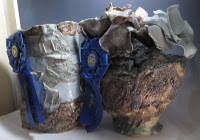 AE Reiff lives in Phoenix where he pursues clay sculpture along with good writing.
AE Reiff lives in Phoenix where he pursues clay sculpture along with good writing.
The postcards embossed on the outer shells of space ships in this story, and on the prow of that ship, refer to his book of poems, Planet 3: Help Send This Book Into Space (Newfoundland, 1986).
The Tom Goat herein cites his “Review of The Shout” in elimae (May 2011).






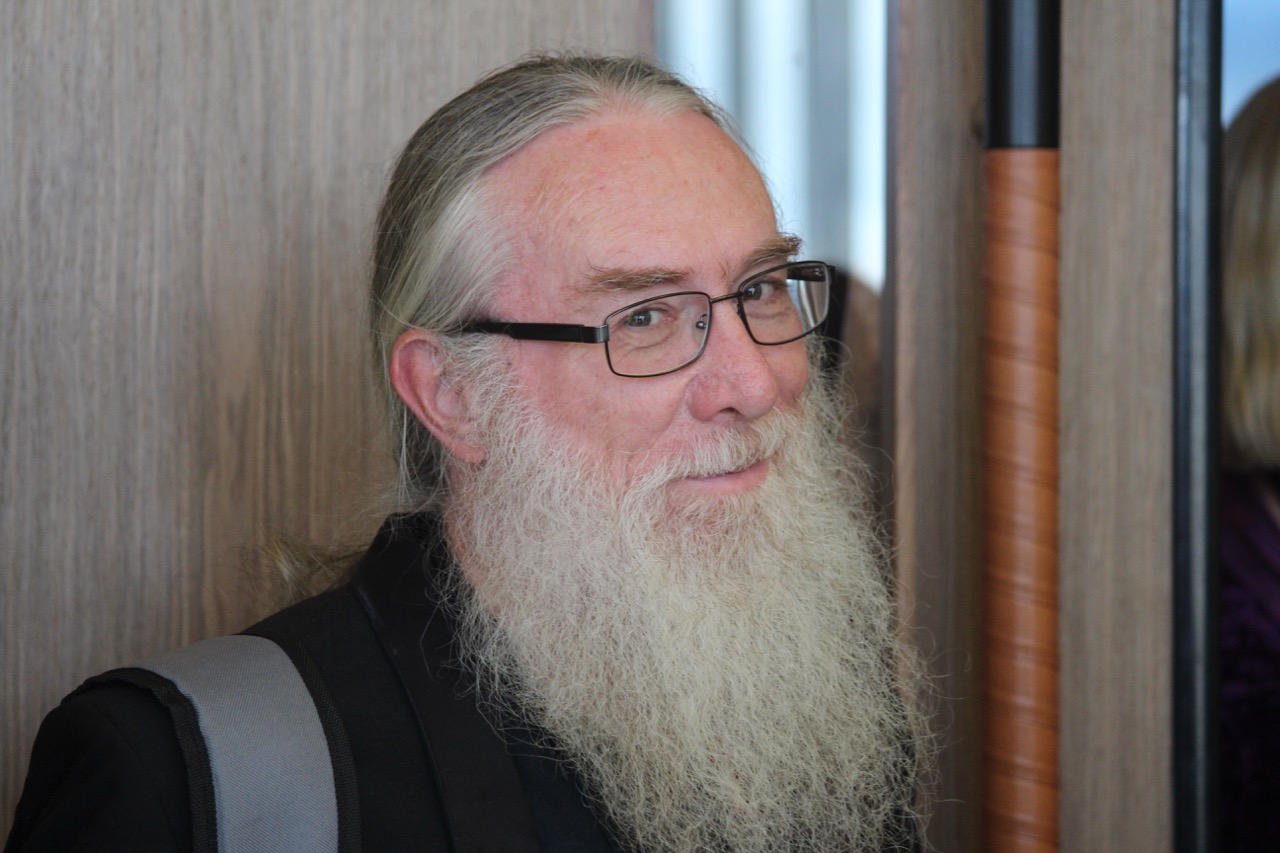


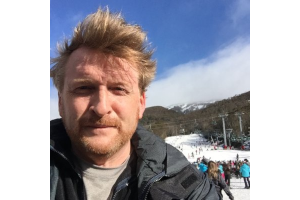



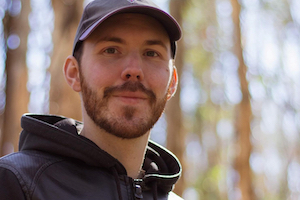
 Alistair Lloyd is a Melbourne based writer and narrator who has been consuming good quality science fiction and fantasy most of his life.
Alistair Lloyd is a Melbourne based writer and narrator who has been consuming good quality science fiction and fantasy most of his life. Chuck McKenzie was born in 1970, and still spends much of his time there.
Chuck McKenzie was born in 1970, and still spends much of his time there. Geraldine Borella writes fiction for children, young adults and adults. Her work has been published by Deadset Press, IFWG Publishing, Wombat Books/Rhiza Edge, AHWA/Midnight Echo, Antipodean SF, Shacklebound Books, Black Ink Fiction, Paramour Ink Fiction, House of Loki and Raven & Drake
Geraldine Borella writes fiction for children, young adults and adults. Her work has been published by Deadset Press, IFWG Publishing, Wombat Books/Rhiza Edge, AHWA/Midnight Echo, Antipodean SF, Shacklebound Books, Black Ink Fiction, Paramour Ink Fiction, House of Loki and Raven & Drake
 Ed lives with his wife plus a magical assortment of native animals in tropical North Queensland.
Ed lives with his wife plus a magical assortment of native animals in tropical North Queensland.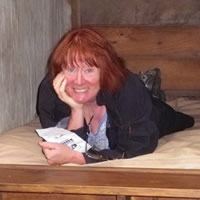 Margaret lives the good life on a small piece of rural New South Wales Australia, with an amazing man, a couple of pets, and several rambunctious wombats.
Margaret lives the good life on a small piece of rural New South Wales Australia, with an amazing man, a couple of pets, and several rambunctious wombats. Mark is an astrophysicist and space scientist who worked on the Cassini/Huygens mission to Saturn. Following this he worked in computer consultancy, engineering, and high energy research (with a stint at the JET Fusion Torus).
Mark is an astrophysicist and space scientist who worked on the Cassini/Huygens mission to Saturn. Following this he worked in computer consultancy, engineering, and high energy research (with a stint at the JET Fusion Torus). Merri Andrew writes poetry and short fiction, some of which has appeared in Cordite, Be:longing, Baby Teeth and Islet, among other places.
Merri Andrew writes poetry and short fiction, some of which has appeared in Cordite, Be:longing, Baby Teeth and Islet, among other places.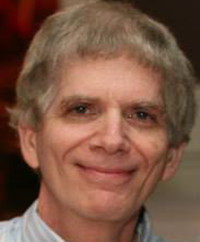 Barry Yedvobnick is a recently retired Biology Professor. He performed molecular biology and genetic research, and taught, at Emory University in Atlanta for 34 years. He is new to fiction writing, and enjoys taking real science a step or two beyond its known boundaries in his
Barry Yedvobnick is a recently retired Biology Professor. He performed molecular biology and genetic research, and taught, at Emory University in Atlanta for 34 years. He is new to fiction writing, and enjoys taking real science a step or two beyond its known boundaries in his Sarah Jane Justice is an Adelaide-based fiction writer, poet, musician and spoken word artist.
Sarah Jane Justice is an Adelaide-based fiction writer, poet, musician and spoken word artist. Emma Louise Gill (she/her) is a British-Australian spec fic writer and consumer of vast amounts of coffee. Brought up on a diet of English lit, she rebelled and now spends her time writing explosive space opera and other fantastical things in
Emma Louise Gill (she/her) is a British-Australian spec fic writer and consumer of vast amounts of coffee. Brought up on a diet of English lit, she rebelled and now spends her time writing explosive space opera and other fantastical things in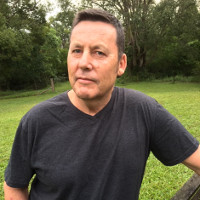 Tim Borella is an Australian author, mainly of short speculative fiction published in anthologies, online and in podcasts.
Tim Borella is an Australian author, mainly of short speculative fiction published in anthologies, online and in podcasts.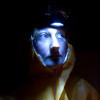
 My time at Nambucca Valley Community Radio began back in 2016 after moving into the area from Sydney.
My time at Nambucca Valley Community Radio began back in 2016 after moving into the area from Sydney.